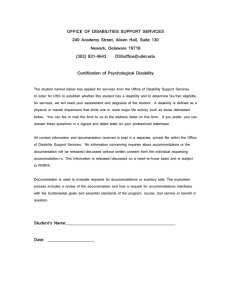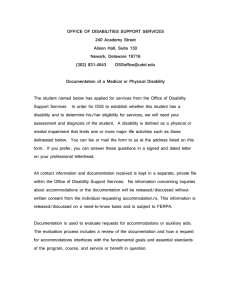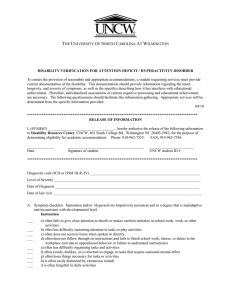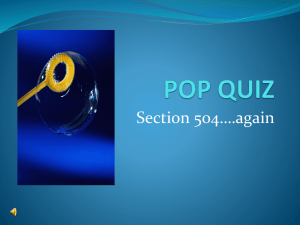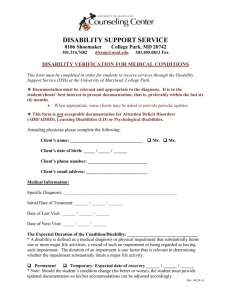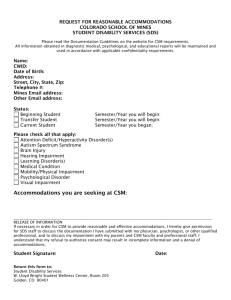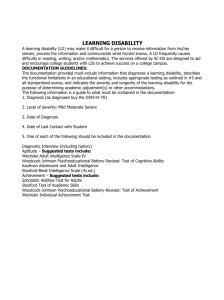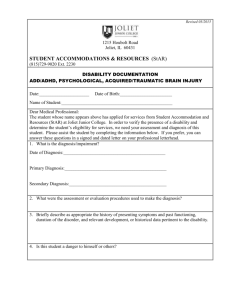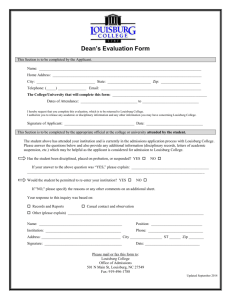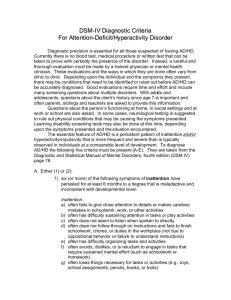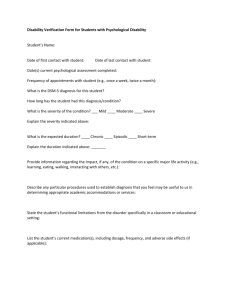questionnaire - Louisburg College
advertisement
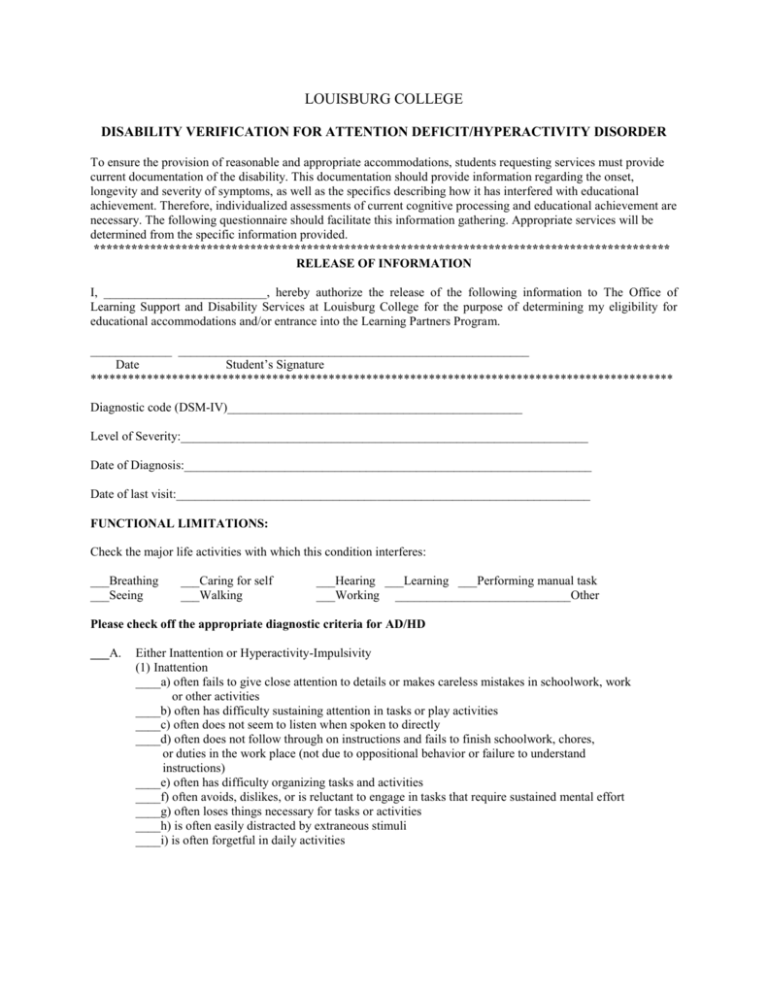
LOUISBURG COLLEGE DISABILITY VERIFICATION FOR ATTENTION DEFICIT/HYPERACTIVITY DISORDER To ensure the provision of reasonable and appropriate accommodations, students requesting services must provide current documentation of the disability. This documentation should provide information regarding the onset, longevity and severity of symptoms, as well as the specifics describing how it has interfered with educational achievement. Therefore, individualized assessments of current cognitive processing and educational achievement are necessary. The following questionnaire should facilitate this information gathering. Appropriate services will be determined from the specific information provided. ******************************************************************************************** RELEASE OF INFORMATION I, __________________________, hereby authorize the release of the following information to The Office of Learning Support and Disability Services at Louisburg College for the purpose of determining my eligibility for educational accommodations and/or entrance into the Learning Partners Program. _____________ ________________________________________________________ Date Student’s Signature ********************************************************************************************* Diagnostic code (DSM-IV)_______________________________________________ Level of Severity:_________________________________________________________________ Date of Diagnosis:_________________________________________________________________ Date of last visit:__________________________________________________________________ FUNCTIONAL LIMITATIONS: Check the major life activities with which this condition interferes: ___Breathing ___Seeing ___Caring for self ___Walking ___Hearing ___Learning ___Performing manual task ___Working ____________________________Other Please check off the appropriate diagnostic criteria for AD/HD ___A. Either Inattention or Hyperactivity-Impulsivity (1) Inattention ____a) often fails to give close attention to details or makes careless mistakes in schoolwork, work or other activities ____b) often has difficulty sustaining attention in tasks or play activities ____c) often does not seem to listen when spoken to directly ____d) often does not follow through on instructions and fails to finish schoolwork, chores, or duties in the work place (not due to oppositional behavior or failure to understand instructions) ____e) often has difficulty organizing tasks and activities ____f) often avoids, dislikes, or is reluctant to engage in tasks that require sustained mental effort ____g) often loses things necessary for tasks or activities ____h) is often easily distracted by extraneous stimuli ____i) is often forgetful in daily activities (2) Hyperactivity-Impulsivity ____a) often fidgets with hands or feet or squirms in seat ____b) often leaves seat in classroom or in other situations in which remaining seated is expected ____c) often runs about or climbs excessively in situations in which it is inappropriate (in adolescents or adults, may be limited to subjective feelings or restlessness) ____d) often has difficulty playing or engaging in leisure activities quietly ____e) is often “on the go” or often acts as if “driven by a motor” ____f) often talks excessively ____g) often blurts out answers before questions have been completed ____h) often has difficulty waiting turn ____i) often interrupts or intrudes on others ___ B. Some hyperactive-impulsive or inattentive symptoms that caused impairment were present before age 7 years. ___ C. Some impairment from the symptoms is present in two or more settings. ___ D. There must be clear evidence of clinically significant impairment in social, academic, or occupational functioning. ___ E. The symptoms do not occur exclusively during the course of a Pervasive Developmental Disorder, Schizophrenia, or other Psychotic Disorder and are not better accounted for by another mental disorder. How does the condition(s) affect the student in the activities required in an academic environment? Describe below the substantial functional limitations and/or behavioral manifestations (e.g., easily distracted, poor concentration, difficulty focusing for extended period of time, difficulty formulating and executing plan of action, difficulty with task management, easily agitated and frustrated with people and situations) and your recommended reasonable accommodations: (e.g., extended time, separate testing area, note takers, priority registration, etc.) Diagnosis _________________ _________________ _________________ _________________ _________________ _________________ Substantial Functional Limitations ____________________________ ____________________________ ____________________________ ____________________________ ____________________________ ____________________________ Reasonable Accommodation _________________________ _________________________ _________________________ _________________________ _________________________ _________________________ Is there any indication that this student may have an additional diagnosis like depression, anxiety, etc.? ________________________________________________________________________________ Have you recommended any type of therapy?______________________________________________ Please include and attach any information you have on learning disability testing, intellectual functioning, and/or academic problems that you feel we should be aware of in order to help this student. Was medication prescribed?___________ If yes, what?_____________________________________ Dosing schedule:____________________________________________________________________ Frequency of monitoring:_____________________________________________________________ Response to medication:______________________________________________________________ Will client be obtaining prescriptions from you during the academic year (circle one)? YES NO Is the student complying with medicine or other treatment recommendations for AD/HD and other comborbid diagnoses? Circle one. YES NO If no, please explain your answer in detail. __________________________________________________________________________________ ___________________________________________________________________________ ___________________________________________________________________________ ___________________________________________________________________________ ___________________________________________________________________________ Thank you for your help in providing this information so that we may begin providing services as soon as possible. Please mail this form to the address shown below or have the client return it to our office in a signed and sealed envelope. PLEASE ATTACH YOUR BUSINESS CARD TO THE DOCUMENT OR ANOTHER FORM OF IDENTIFICATION FOR THE STUDENT FILE. Provider’s name____________________________________Phone ____________________________ My Specialty is (List your specialty on the line following your classification) MD _______________________________________________________________________________ Psychiatrist_________________________________________________________________________ Other______________________________________________________________________________ Address ____________________________________________________________________________ Street City State Zip Signature________________________________________________Date________________________ Mail to: Call : Karen Martin Director of Learning Support & Disability Services Louisburg College 501 N. Main Street Louisburg, NC 27549 919-497- 3236 FAX: 919/496-6733 Revised 8/2008
